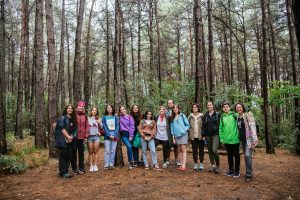Almost five years ago, a handful of UK funders, with the support of the Association of Charitable Foundations (ACF), launched the Funder Commitment on Climate Change, with the aim of providing a simple – yet holistic – framework for foundations to consider their agency within the context of the climate emergency. Today, this has grown into #PhilanthropyForClimate, a diverse movement of over 800 foundations across the globe with a shared commitment to urgent climate action.
Through annual progress tracking, we see that foundations are steadily making progress towards integrating climate across various aspects of their work – from their governance to their grantmaking. For foundation signatories of the commitments, although differing in size, mission and geographic location and focus, the framework helps spark, structure, strengthen, and sustain their climate awareness and action, whether they are just getting started or are ready to demonstrate leadership in the field.
Sparking their potential to act
The Sabancı Foundation was established in 1974 by the Sabancı brothers in line with the principle of ‘sharing what we have obtained from this land with its people.’ The foundation is among the largest foundations established by a family in Turkey and works in education, arts and culture, and social change efforts. The foundation has over 120 institutions spread throughout Turkey, including schools, libraries, dormitories, hospitals, and arts and culture centres

Roots and Shoots Türkiye, A Participatory and Safe Youth Activism Project supported by Sabanci’s Climate Grant Programme
In recent years, Türkiye, like many places across the world, has experienced significant climate impacts: wildfires, landslides, droughts, heatwaves, floods. These are no longer sporadic events but are impacting the country with an increasing frequency and intensity and are disproportionately damaging to vulnerable people and communities.
As a foundation focusing on education, social change, culture and the arts – and particularly on women, young people and people with disabilities, in recent years, General Manager Nevgül Bilsel Safkan and her team at the Sabancı Foundation came to realise that climate change is a significant current and future problem and increasingly impossible to ignore. Climate also emerged as one of the most significant issues identified in the foundation’s search for a big-impact project.
‘Climate and philanthropy’ has emerged as a key strategic priority, which will now sit alongside the areas that the foundation has traditionally worked on, namely education, arts and culture and social change’
As a foundation, although climate is a relatively new area of their work, they feel that they have a unique role to play: ‘We cannot ignore the role of philanthropy when it comes to climate change,’ says Nevgül Bilsel Safkan, ‘Philanthropy can look at the underlying, systematic causes of the climate crisis and focus on the needs of disadvantaged communities who are most affected.’
The Sabancı Foundation team realised the potential of commitments to create meaningful and lasting change within their organisation after they signed the European Philanthropy Statement on Covid-19, launched by the then-European Foundation Centre and DAFNE, to encourage solidarity and flexibility during the global pandemic.
As a result, signing the International Philanthropy Commitment on Climate Change was easy for the foundation’s Board to approve. The commitment offered the foundation a helpful, holistic framework to understand their levers for climate action – which was easily adapted to their unique context and mission.
Structuring change: A multi-pillar approach to climate action
Learning from international peers and networks, including the Foundations Platform F20, WINGS and Philea, Nevgül and her team quickly got to work. The foundation started by applying a climate lens to their existing programmes and projects – starting not from climate per se but the communities and issues that they know well.

Papuduk Children’s Book Workshop
For example, as part of their work around education, they published a book series for children to raise awareness around climate and nature in early years, which has reached over 160,000 students and teachers and they have opened two vocational high schools focused on renewable energy. Through their arts and culture programme, they have created awareness through annual short film competitions focusing one year on water and another on immigration and the climate crisis.
Committing additional resources to fighting climate change was also central to the foundation’s approach. Their first climate grant went to Roots and Shoots Association, an organisation supported by Dr Jane Goodall. Following a series of extreme weather events and natural disasters, the foundation also received approval for a ‘Disaster and Emergency Fund’ to mitigate the impacts of climate change and became a member of the Disaster Network Türkiye – a participatory, rights-based network of volunteer organisations. These grantmaking processes strengthened the foundation’s network and allowed them to meet people working directly on climate change.
Across these pillars – crucial to the foundation’s rapid progress in this sphere – is understanding and embracing the idea that this is a learning journey. ‘For other themes, such as gender equality, disability, we feel like we know the partners and the issues. But when it comes to climate, we know we are not the experts, but we are committed to learning.’ Nevgül Bilsel Safkan added.
Additionally, two staff members act as climate champions within the team, continually developing their knowledge of climate-related issues and disseminating these learnings across the organisation. The foundation also creates regular opportunities for the whole team – and sometimes broader sector – to learn about climate change.
Strengthening the foundation’s ambitions
Although the team themselves refer to their initial climate actions as ‘baby steps,’ the foundation’s climate ambitions are increasing steadily as they learn, always asking themselves: ‘How can we do even more?’
‘Climate and philanthropy’ has emerged as a key strategic priority, which will now sit alongside the areas that the foundation has traditionally worked on, namely education, arts and culture and social change. This reflects a significant milestone in terms of embedding climate action in the strategy of the foundation.
Whilst they are clearly committed to doing more, the dilemma that Nevgül and her team are currently facing is what to prioritise given the scale and complexity of the climate crisis and its many impacts across Türkiye.
A 2074 vision: A sustained commitment to climate
With 2024 marking their 50th anniversary, the foundation is looking ahead to the next 50, and Nevgül hopes that the Sabancı Foundation will have significantly contributed to addressing the climate crisis – not only as an individual foundation but as part of the philanthropic ecosystem, in Türkiye and beyond.
‘What we can change on an individual level is limited, but if we all do something together then the impact will be big enough.’ Her hope is that all foundations embrace climate as part of what they do: ‘Every day that we don’t act, a bleak future becomes more and more inevitable. Anything we can do, we should do now – for the planet and for future generations.’
Karalyn Gardner is Programme Manager – Climate Coalition at Philea.






Comments (0)